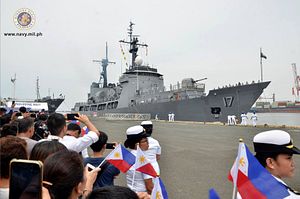Over the weekend, the Philippines officially announced its decision to indefinitely postpone two key international naval engagements. While the decision itself was not surprising given the global coronavirus pandemic, it nonetheless highlighted the challenge facing the Philippine Navy (PN) in this wider context.
As I have observed previously, the global coronavirus pandemic has not spared Southeast Asia, and the Philippines has been among the hardest hit countries in the region, with much of the country still on lockdown. This has affected the Philippine Navy as well – whether it be the pipeline for new equipment or its ability to perform its functions such as preserving Philippine interests in the South China Sea while also helping manage COVID-19.
Over the weekend, the Philippine Navy’s COVID-19 challenge was in the spotlight again with the postponement of its two key international engagements. The PN announced on Sunday that it was postponing its hosting of the 17th Western Pacific Symposium (WPNS) and the International Fleet Review (IFR) from May 19-21 – two key activities that had presented significant opportunities to boost Manila’s international image, as they would be a first hosting opportunity. Both engagements had been scheduled to coincide with the PN’s 122nd founding anniversary.
Per a statement issued by the Philippine Navy on Sunday, the PN was in the process of sending out notice to navies that it was going to postpone both activities indefinitely. The press release noted that the “rapid increase of cases worldwide, which also affect 21 member countries and 8 observer states, compelled the PN (Philippine Navy) to defer the historic convergence of navy chiefs and warships.”
The decision comes as no surprise. Though planning of these activities had initially proceeded into March even during the early stages of the COVID-19 pandemic, with the Philippines’ coronavirus challenge deepening since and a range of bilateral and regional defense activities that the Philippines is involved in canceled previously – including the U.S.-Philippines Balikatan exercises – speculation had already arisen as to when, not if, the postponement would be formally announced. And given the fact that Manila and other key Asian states are consumed by COVID-19 to varying degrees with little sense as to how the global pandemic will play out in the coming weeks, coordinating and executing such international engagements would have proved both challenging and risky in terms of health and safety.
Given the importance of WPNS and IFR as international engagements, there will no doubt be a continued focus on if and when they are rescheduled either later in 2020 or in 2021. Meanwhile, as the statement suggested, with those international engagements postponed, the Philippine Navy will be able to turn its focus more squarely on efforts to mitigate COVID-19 within the Philippines.

































